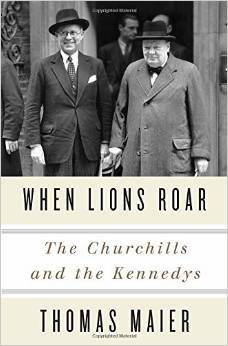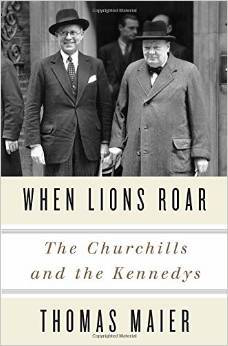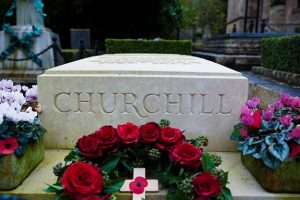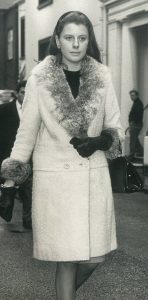
Finest Hour 166
Books, Arts & Curiosities – Kings of the Jungle

July 24, 2015
Finest Hour 166, Winter 2015
Page 28
By CHRIS MATTHEWS
Thomas Maier, When Lions Roar: The Churchills and the Kennedys, New York: Random House, $30.
 The presidential campaign of 1960 between John F. Kennedy and Richard Nixon was, I believe, the last great one. After all, it was the height of the Cold War, which featured heavily in their four eventful TV debates. Millions watched as the candidates paraded through big-city rallies in Chicago, Philadelphia and New York. People wore not just large campaign buttons but also jaunty “boater” hats. For those like me who have loved politics in all its spectacle, it was a time to savor—even now.
The presidential campaign of 1960 between John F. Kennedy and Richard Nixon was, I believe, the last great one. After all, it was the height of the Cold War, which featured heavily in their four eventful TV debates. Millions watched as the candidates paraded through big-city rallies in Chicago, Philadelphia and New York. People wore not just large campaign buttons but also jaunty “boater” hats. For those like me who have loved politics in all its spectacle, it was a time to savor—even now.

2025 International Churchill Conference
One of my personal memories of the Kennedy-Nixon race was my father’s off-hand remark that the young Democratic candidate possessed “a touch of Churchill.” What made it stand out then and long after was that ours was a Republican family, Dad very much a Nixon man. I knew of his admiration for the World War II leader. He was, after all, himself the son of an Englishman. But what explained this multi-gun salute to Jack Kennedy, this recognition that the youthful American carried even in small supply something of the great man who had saved Britain and so honored the twentieth century?
When Lions Roar: The Churchills and the Kennedys by Thomas Maier traces the influence of the great British statesman on the American president. More grandly, it explores the way in which two families of different countries managed, for better or worse, to get so often in each other’s way.
What I like most in Maier’s giant work is the spine of this saga, the all-important record of influence the great soldier-statesman-historian’s life exerted on the future American president. It is the author’s confirmation and addition to this record that Finest Hour readers will embrace strongly.
Even as he drove his political career and grabbed for life’s more immediate pleasures, Kennedy felt the magnetic appeal of Churchill. As a student at Catholic boarding school, he read The World Crisis, the former First Lord of the Admiralty’s work on World War I.
There would be other signs of Kennedy’s devotion, like his love of quoting Churchill on the death of Raymond Asquith, the prime minister’s son killed at the Somme: “The war which found the measure of so many never got to the bottom of him; he went to his fate cool, poised, resolute, matter-of-fact, debonair.”
But Kennedy had to contend with his father’s antithetical view on the subject of this grand admiration.
In May 1938, not long after arriving as US Ambassador in London, Joseph Kennedy fell in with the Cliveden set, those opposed at any cost to the threatening war with Germany. It was in this elite setting that the senior Kennedy, one of the wealthiest men in the world, decided not to place his bet on Britain. Instead, he took the side of famed aviator Charles Lindbergh that Britain’s military capacity was no match for Adolf Hitler’s war machine.
Getting wind of it, Churchill, in Maier’s words, “fumed” at the news. He worried that an anti-war partnership between Kennedy and Lindbergh might push the government of Neville Chamberlain “further down the road of appeasement.”
The 1938 conference at Munich became the point of no return in the antipathy between Churchill and Joe Kennedy. The latter backed Chamberlain’s decision to meet Hitler’s demand for the Sudetenland, believing it a small price to pay for peace. Churchill saw it as merely buying time in the currency of national honor. “England had been offered a choice between war and shame,” he observed. “It has chosen shame and will get war.”
By the summer of 1940, a significant chasm had opened between Kennedy father and son. Jack’s Why England Slept was presented on the surface as a counterpoint to Churchill’s While England Slept. It was taken as an American’s justification for Britain’s refusal to confront German demands in 1938. In truth, it was a subversive challenge to appeasement.
In seeming to back his father’s belief that Britain was ill-prepared to confront Germany in ’38, Jack’s book offered a compelling case for his fellow Americans not to follow the British example. “England made many mistakes,” the son wrote, “she is paying heavily for them now. In studying the reasons why England slept, let us try to profit by them and save ourselves her anguish.” In other words, it was time for the United States to get its act together and re-arm or suffer the same fate.
Young Kennedy’s book opened an even wider front against his father’s thinking. The elder Kennedy saw Hitler as Europe’s problem; Jack shared Churchill’s vision of the dictator’s ambition: “A defeat of the Allies may simply be one more step toward the ultimate achievement—Germany over the world.”
Jack Kennedy viewed the world the way his hero did, not the way his father did. His father looked at life as a businessman and parent: he loved his profits, loved his sons, and wanted both protected. He saw US involvement in a Second World War as lethally hazardous to both, especially his family.
Jack saw the battle—and the world—in larger terms, as he would to the end. He remained absorbed in Churchill’s writings after the war. Mark Dalton, Kennedy’s campaign manager in his first race for Congress in 1946, recalled a weekend visit to Hyannis Port in which his friend called him up to his room to listen to something he had just read. “Did you ever read anything like that in your life?” Kennedy demanded, thrilled again by his hero’s words. Across the span of decades, Dalton recalled it was Churchill’s biography on Marlborough that he was quoting from.
As he fought his battle for the presidency, Kennedy was caught in his bathtub listening to Churchill’s wartime speeches on the phonograph. The Democratic candidate was working up that power—and great purpose—in his public voice, which even my very Republican father would catch.
Kennedy, of course, had the pre-war record of his own father to manage. At key points in the 1960 campaign, he needed to defend his family—and by association himself— from charges of appeasement. “I wasn’t any Chamberlain-umbrella policy man,” candidate Lyndon Johnson, then the Senate majority leader, declared as the delegates arrived at the Democratic National Convention that summer.
Richard Nixon waited until the third of their televised debates to lay it into his rival. “This is the story of dealing with dictators,” he instructed the country and Kennedy on how to win the Cold War. “This is something that Senator Kennedy and all Americans know well. We tried this with Hitler. It didn’t work. He wanted, first, we know, Austria, and then he went on to the Sudetenland, and then Danzig, and each time it was that this is all he wanted.” On national television Nixon was reminding Jack Kennedy of his father’s disgrace.
In fact, Kennedy was playing the same nasty game, trying to make his opponent appear weak in opposing the Communists. He was skirting to Nixon’s right in both demanding action against Fidel Castro and claiming that a “missile” gap existed between the USSR and the US.
Here again it was the Churchill model at work. As author Barbara Leaming explained in Jack Kennedy: The Education of a Statesman, the American was pushing peace through strength. It was Churchill’s notion of “arming not to fight but to parlay.” This strategy Churchill claimed both before and after the war could have avoided calamity. Had Britain been strong, Hitler would have acted differently.
When Lions Roar presents an expansive look, as I noted earlier, at the Churchills, the Kennedys, and their entangling relations. Much is included here about the overlapping sexual forays of Joseph Kennedy, Randolph Churchill, and all the rest. There are accounts of cuckolding, philandering and failed marriages.
I suppose there are those today with a taste for this sort of information. We watch House of Cards and The Good Wife and are now accustomed to sex running not around the edges of political life but right through its midsection. And so we find it all here.
Initially, it struck me as odd that the author of Masters of Sex should be writing a grand volume about the greatest statesman of the twentieth century.
Then it didn’t.
Perhaps that is a good, even healthy test for the reader. How often in reading about our heroes do we find ourselves having to distill the great and worthy from the small and tawdry?
In the case of Jack Kennedy, we all know of the one person who had to assume this messy task.
A week to the day after her husband was killed, Jacqueline Kennedy told Life magazine’s Theodore White what she believed about the two sides of the man she knew and loved.
One was the American leader who had, from the time he was a sickly little boy, spent his life reading and looking up to Winston Churchill. “This little boy in bed so much of the time. All the time he was reading history. History is what made Jack,” she said.
She was trying her hardest to set the lost president’s “hero, idealistic side,” above the other, less-elevated “pragmatic” side.
So it is with Thomas Maier’s ambitious book. It presents us the task of separating the wheat from the chaff—and, in so doing, relishing the difference between the great deeds of our heroes from the seedbeds from which they rose.
In the end, it was Winston Churchill’s and John F. Kennedy’s public roles that mattered: what they did, what they said, what their message was to mankind’s long history. “Words,” as the older man put it well, “are the only thing that last forever.”
Dad had it right about that young man for whom he never voted: He had a touch of Churchill and that made all the difference.
Chris Matthews, the host of Hardball on MSNBC, is on the board of The Churchill Centre.
Subscribe
WANT MORE?
Get the Churchill Bulletin delivered to your inbox once a month.
Oops! We could not locate your form.
Privacy




